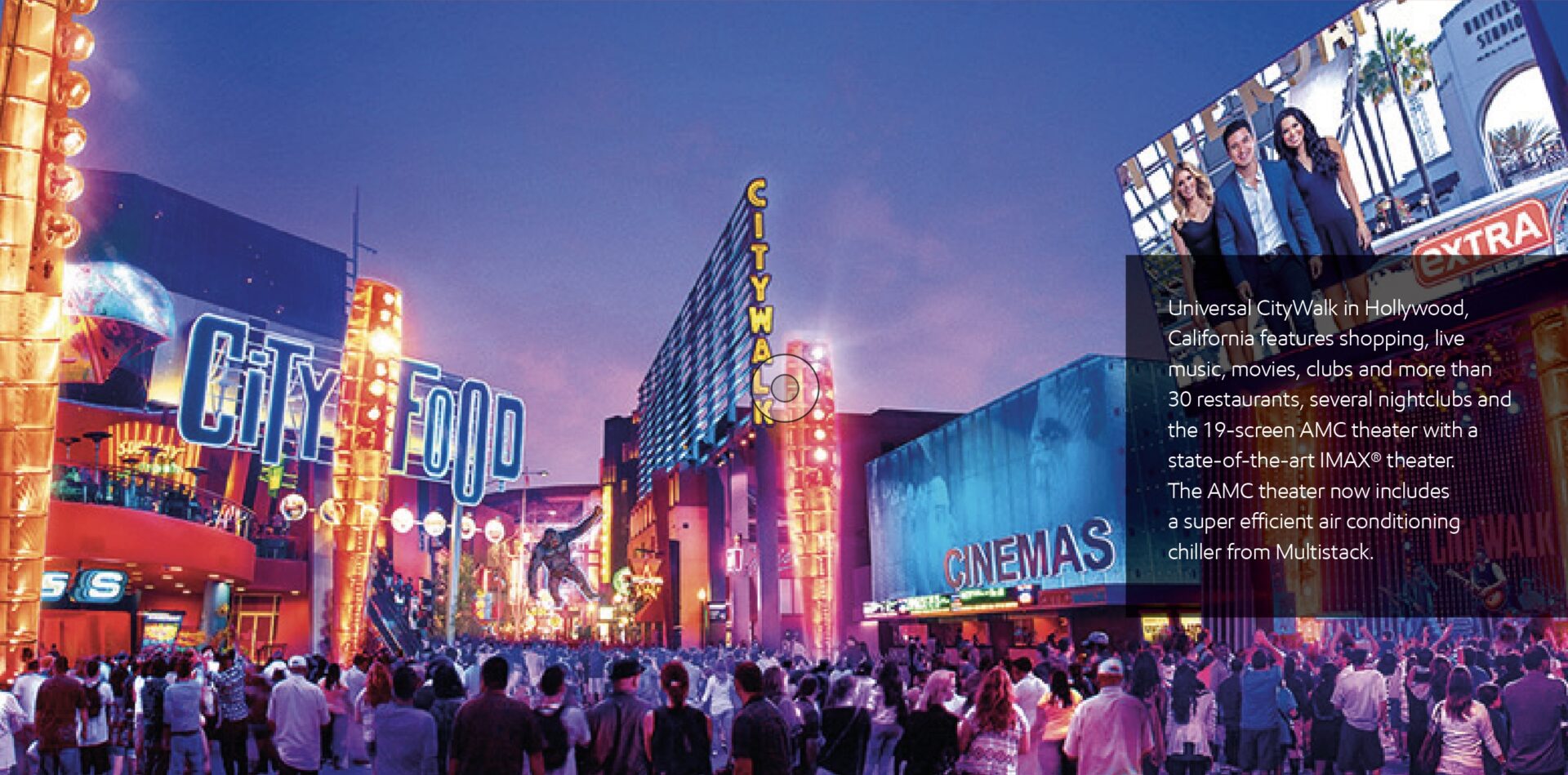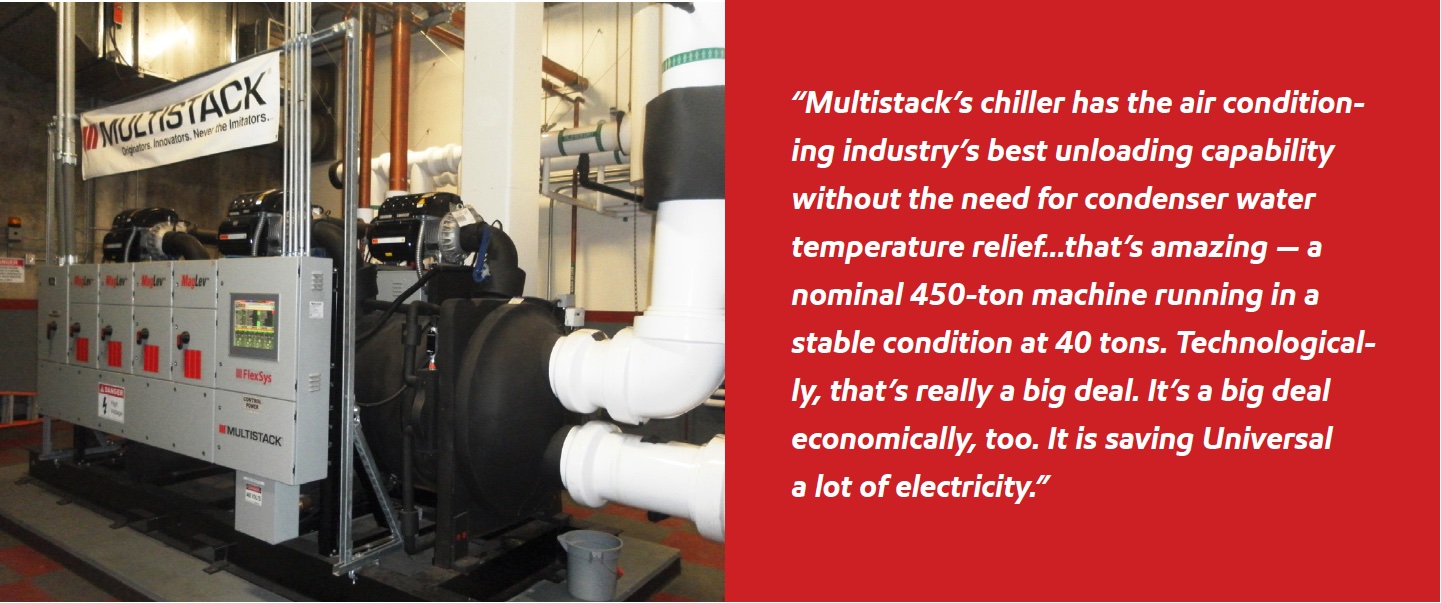Multistack MagLev® Chillers Star in NBC Universal/CityWalk AMC Theater Retrofit Project
Hollywood, California

Creating the best movie-going experience for film lovers is critical for AMC Universal’s CityWalk theater complex, located north of Los Angeles in Universal City. Eighteen screens plus a huge seven-story, 422-seat IMAX auditorium create an amazing movie-viewing experience, with digital surround sound and stadium-style rocker seats. Because comfort is so critical, AMC worked with Los Angeles-based Air Treatment Corporation to install a Multistack centrifugal chiller with MagLev variable speed compressors to deliver reliable, efficient, precise temperature control under any conditions
Steve Hamm, Director-Technical Services, Universal Studios Hollywood, said “The Multistack chiller is a real workhorse. It just runs and runs. We’ve had absolutely no problems…a couple little bugs initially that were corrected by Multistack right away, but it has been running perfectly… and the control system not only takes care of the chiller, it even corrects for problems out in the system.”
“The CityWalk Stadium 19 complex requires reliable, efficient cooling 365 days a year,” says a systems specialist for Air Treatment Corporation, who oversaw the project. “Nobody wants to refund tickets for uncomfortable customers. The old system was a massive thermal storage system using two large screw compressors. It initially made sense to use a thermal storage system because, at that time, Southern California Edison provided incentives to use electricity during the off-peak hours of midnight to 6:00 a.m. During the night the system would build ice, then melt it during the day to provide cooling to avoid paying peak demand charges for electricity.
“ But when Universal installed their own 12 kV switchgear, it changed their operating plan. Universal was no longer dependent on SCE for 480 VAC power and could generate their own electricity, so peak charges were no longer an issue. Universal asked whether they still needed that thermal storage system. This solution provided the ability to remove the storage system. It was a different way to approach this.”
“The Multistack chiller is a real workhorse. It just runs and runs. We’ve had absolutely no problems…it has been running perfectly… and the control system not only takes care of the chiller, it even corrects for problems out in the system.”
Multistack Chiller Replaces Thermal Storage
Air Treatment staff talked to an engineer about replacing the thermal storage system. It was configured with three 970 ton/hour thermal storage tanks and two screw compressors in a sub-basement. The chillers were connected by a six-inch discharge line and a 4 1/8” liquid line with two evaporative condensers on a roof 70 feet above the basement. The engineer suggested replacing the screw chillers with a standard, water-cooled centrifugal chiller and replacing the evaporative condensers with cooling towers. Ten- or 12-inch diameter piping and pumps would circulate condenser water from the basement to the rooftop.
They had just installed those evaporative condensers in 2006. They were in good shape so it was suggested that rather than change them out, they chose to keep using them. Evaporative condensers in hot, dry climates like Southern California deliver lower condensing temperatures, which can significantly reduce chiller energy consumption. Multistack offers a condenserless flooded centrifugal chiller design that could use those evaporative condensers. It would eliminate the need for a recirculation system using cooling tower, large piping, condenser water pumps and water treatment system.
Essentially, that’s what was done. AMC took out the screw chillers and tanks and installed a Multistack MagLev air-cooled flooded chiller with 450 ton capacity at a 42F design leaving water temperature. It has revolutionized AMC operations. They gained an unbelievable amount of space in the mechanical room and the sound and efficiency benefits are the direct result of the Multistack chiller with MagLev compressors.
MagLev Compressors Drive Condenserless Chiller Performance
As a unique condenserless flooded design, the Multistack chiller employs innovative magnetic levitation bearing technology—in this case, four variable speed MagLev compressors.
A conventional centrifugal chiller is designed to operate efficiently at full load conditions, but that’s typically only about five percent of the time. For the other 95 percent, they don’t need all that cooling capacity. To lower capacity, centrifugal chillers typically employ inlet guide vanes and speed controls to reduce refrigerant flow. Hot gas bypass is another technique used to keep the chiller from surging or stalling at low-load conditions, but that technique would really hurt efficiency.
Because the CityWalk complex has 18 theaters plus an IMAX screen, there are times when the seats are full and times when they’re not. This trend is particularly evident as AMC looks to return to pre-Covid activity levels. A conventional centrifugal chiller would constantly need to throttle capacity to meet the changing load. That’s not the case with the Multistack solution. Another reason to like MagLev variable speed compressors is they can easily reduce speed and reduce capacity to meet part-load conditions.
Steve Hamm adds, “This chiller has never missed a beat and I’ve been watching it closely because I’m the person who sold my company on this chiller and system concept. It can run smoothly from 400 tons all the way down to 10 or 15 tons capacity. The efficiency is amazing. The previous system had two 450-hp motors that were either on or off.”
MagLev Compressor Performance Enhances Centrifugal Chiller Performance
The Multistack air-cooled MagLev flooded chiller uses four MagLev, two-stage TT-400 Turbocor variable speed, magnetic-bearing compressors. Each compressor incorporates an integrated variable speed drive (inverter) to change output voltages to regulate motor speed. Slower compressor speed reduces refrigerant flow, which reduces cooling capacity, which reduces energy consumption.

The speed of each MagLev compressor can be reduced from 100 percent to 30 percent, or slower. That allows precise reductions incapacity to match cooling requirements across the range. With the FlexSys® control system from Multistack, the chiller provides fast control response and can unload from full load to minimum flow in one minute, run at reduced flow for a minute, then reload to full load a minute later.
According to Multistack, in addition to the variable speed control, the MagLev compressor family employs built-in inlet guide vanes (IGVs) to trim the compressor capacity at low loads. The blades of the impeller inside centrifugal compressors are like airplane wings – when speed slows down, the wings experience turbulence. Just like an aircraft can stall at low speeds, so can a centrifugal compressor. The vanes control the amount of gas flowing to keep the compressor trimmed to maintain system stability.
The Multistack air-cooled MagLev flooded chiller, however, uses four compressors operating in parallel. That allows each compressor to turn on and off to handle extremely low loads. For example, the Multistack FlexSys controls uses a timing sequence that compares chilled water set point and inlet guide vane position. The controller sees a decrease in inlet guide vane position and so begins monitoring kW consumption. When the cooling load can be more efficiently carried by one or two compressors instead of two or three, a compressor is shut off and the remaining operating compressor(s) carry the cooling load. A fourth compressor serves as a redundant backup if one of the compressors goes off line and cannot operate.
Multistack uses its own FlexSys control system to operate each compressor individually in conjunction with the chiller. Precise, individual control of each compressor assures optimum chiller and system energy efficiency—and complies with ASHRAE 90.1 2010 and proposed industry standards. The oil-free compressor technology also means no refrigerant-entrained oil to hinder heat transfer and reduce efficiency as can happen in traditional chillers with oil lubrication systems. And no lubrication system
means fewer parts, greater reliability, and lower maintenance costs. All MagLev chillers are run-tested on Multistack’s AHRI Certified test loop.
“Thanks to four MagLev variable speed compressors, Multistack’s chiller has the air conditioning industry’s best unloading capability without the need for condenser water temperature relief. This chiller lets AMC turn down capacity to just 40 tons with no issues,” says Hamm. “That’s amazing— a nominal 450 ton machine running in a stable condition at 40 tons. Technologically, that’s really a big deal. It’s a big deal economically, too. It is saving us a lot of electricity.”
While the use of a photovoltaic array makes a before-and-after electric use and cost comparison difficult, with the new Multistack chiller the system now consumes about 10 percent less energy than before—which translates to huge energy cost savings for Universal. The new Multistack chiller also helped Universal qualify for a nearly $96,000 rebate from Southern California Edison Business Incentives.
Other benefits include the MagLev compressor’s inverter that enables a “soft start.” Unlike a conventional chiller that can pull as much as 800 to 1,000 amps when starting, each MagLev compressor draws only two amps at start-up which avoids start-up demand spikes, smooths out the system load and reduces thermal stress on internal motor components.
Because the chiller is wired into the utility, the MagLev compressor’s inverter maintains the correct output voltage and phase to minimize voltage and harmonic problems if grid power is ever lost.
Also critical to the owner is the definite reduction in noise. “It’s night and day,” Hamm says. “The loudest thing in the mechanical room is the chilled water pumps. You can have a normal conversation in here. That would have been impossible before.”
The peak sound level of a MagLev compressor is only 71 dB(A)— about the sound of a conversation. The low noise is a result of a compressor shaft with twin impellers formed as a single assembly that rotates on magnetic bearings. This design not only eliminates compressor friction and vibration, it also eliminates the need for an oil lubrication system.
“AMC and Universal Studios are very happy with what this condenserless, flooded chiller has accomplished,” notes Hamm. “Universal even put red & gray tile on the floor and painted the room an elegant grey with a red stripe. The MagLev compressor is getting real star treatment.”
Steve Hamm said, “It is fun to have people here looking at this chiller and system. We’ve installed (2) similar chillers next door at the 5511 Building.”



